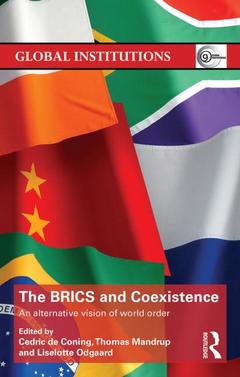The BRICS and Coexistence An Alternative Vision of World Order Global Institutions Series
Coordonnateurs : de Coning Cedric, Mandrup Thomas, Odgaard Liselotte

The grouping consisting of Brazil, Russia, India and China (BRIC) was initially meant to be nothing more than clever investment jargon referring to the largest and most attractive emerging economies. However, these countries identified with the BRIC concept, and started to meet annually as a group in 2008. At their fourth summit in 2011, they added South Africa to become the BRICS. By then the BRICS had fully morphed from investment jargon to a name for a new economic and political grouping that had the potential to challenge the unipolar hegemony of the United States and its Western allies.
This work analyses the extent to which the concept of coexistence explains the individual foreign policies of the BRICS countries. The editors define coexistence as a strategy that promotes the establishment of a rule-based system for co-managing the global order. It recognizes that different states may legitimately pursue their own political and economic interests, but they have to do so within the bounds of a rule-based international system that ensures the peaceful coexistence of states.
The BRICS and Coexistence addresses the political dimension of the emergence and influence of the BRICS in the international system and will be of interest to students and scholars of Politics, Development and International Relations.
Introduction, Cedric de Coning, Thomas Mandrupand Liselotte Odgaard 1. BRICS and coexistence, Cedric de Coning 2. Brazil as a rising power: Coexistence through universalism, Adriana Erthal Abdenur 3. Russia, BRICS and peaceful coexistence: Between idealism and instrumentalism, Flemming Splidsboel Hansen and Alexander Sergunin 4. Indian foreign policy and coexistence: continuity and change in the post-cold war era, Surupa Gupta and Shibashis Chatterjee 5. China and coexistence: Beijing’s policy on energy, United Nations Security Council diplomacy and sovereignty disputes, Liselotte Odgaard and Zha Daojiong 6. South Africa’s ‘diplomacy of ubuntu’: an African approach to coexistence?, Thomas Mandrup and Karen Smith 7. Conclusion: Coexistence in between world order and national interest Cedric de Coning, Thomas Mandrup and Liselotte Odgaard
Cedric de Coning (South Africa) heads the Peace Operations and Peacebuilding Research Group at the Norwegian Institute of International Affairs (NUPI) and he is also a Senior Advisor on Peacekeeping and Peacebuilding for the African Center for the Constructive Resolution of Disputes (ACCORD). Cedric has a Ph.D. from the Department of Philosophy at the University of Stellenbosch.
Thomas Mandrup is an Assistant Professor at Royal Danish Defence College, Denmark, and an external lecturer at the Centre for African Studies, University of Copenhagen, Denmark
Liselotte Odgaard is an Associate Professor at the Royal Danish Defence College. Her most recent international positions was in 2007 when she was a visiting fellow at the Fairbank Center, Harvard University, and 2008-09, when she was a residential fellow at the Woodrow Wilson International Center for Scholars, Washington, D.C.
Date de parution : 09-2014
13.8x21.6 cm
Disponible chez l'éditeur (délai d'approvisionnement : 14 jours).
Prix indicatif 172,36 €
Ajouter au panierDate de parution : 12-2016
13.8x21.6 cm
Disponible chez l'éditeur (délai d'approvisionnement : 14 jours).
Prix indicatif 46,39 €
Ajouter au panierThème de The BRICS and Coexistence :
Mots-clés :
BRICS; Global Institutions; Wilkinson; Weiss; emerging economies; global system; Socioeconomic Development; South Africa’s Foreign Policy; National Development Path; India Brazil South Africa Dialogue; BRICS Countries; BRICS Grouping; Mutual Non-aggression; BRICS States; Energy Policy; South South Development Cooperation; India Brazil South Africa Dialogue Forum; Global Security Management; UNSC Resolution; Brazilian Foreign Policy; Brazilian Government; Indian Foreign Policy; Foreign Policy Practices; SADPA; South African Foreign Policy; post-Cold War Foreign Policy; BRICS Leaders; Foreign Policy; Arab League’s Peace Plan; East China Seas; Indian Foreign Policy Elite



